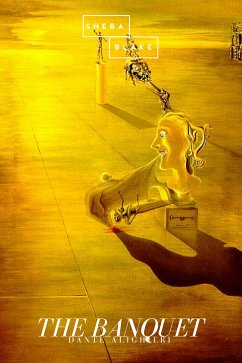The Banquet is a work written by Dante Alighieri roughly between 1304 and 1307. This unfinished work of Dante consists of four trattati, or "books": a prefatory one, plus three books that each include a canzone (long lyrical poem) and a prose allegorical interpretation or commentary of the poem that goes off in multiple thematic directions. The Banquet is a major stage of development for Dante, very different from the visionary world of the Vita nuova (although like the earlier work it too is a medium for the author's evolving sense of artistic vocation and philosophical-spiritual quest). This difference is reflected in how the two works use the prosimetrum format: in the Vita Nova there is a complex interrelation and intertwining between the prose and the poetry, while in the Banquet large blocks of prose have an autonomous existence apart from the poems; the content of the poetry is not amplified or edited in the prose so much as commented upon prosaically, to serve as points of departure for the various subjects that the Banquet discusses. Dante himself tells us that the prose of the Banquet is "temperate and virile," in contrast to the "fervid and passionate" prose of the Vita Nova; and that while the approach to this in the work of his youth was "like dreaming" the Banquet approaches it subjects soberly and wide awake, often modeling its style on Scholastic authors. The Banquet is a kind of vernacular encyclopedia of the knowledge of Dante's time; it touches on many areas of learning, not only philosophy but also politics, linguistics, science, and history. The treatise begins with the prefatory book, or proem, which explains why a book like the Banquet is needed and why Dante is writing it in the vernacular instead of Latin. It is one of Dante's early defenses of the vernacular, expressed in greater detail in his (slightly earlier) linguistic treatise De vulgari eloquentia (On Eloquence in the Vernacular).
Dieser Download kann aus rechtlichen Gründen nur mit Rechnungsadresse in A, B, BG, CY, CZ, D, DK, EW, E, FIN, F, GR, H, IRL, I, LT, L, LR, M, NL, PL, P, R, S, SLO, SK ausgeliefert werden.


